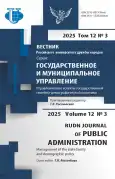Artificial intelligence in the public administration system of Russia and the European Union: comparative legal analysis. Part I
- Авторлар: Nuriev B.D.1
-
Мекемелер:
- State University of Management
- Шығарылым: Том 12, № 3 (2025): MANAGEMENT OF THE STATE FAMILY AND DEMOGRAPHIC POLICY
- Беттер: 404-416
- Бөлім: CURRENT PROBLEMS OF PUBLIC ADMINISTRATION
- URL: https://bakhtiniada.ru/2312-8313/article/view/349664
- DOI: https://doi.org/10.22363/2312-8313-2025-12-3-404-416
- EDN: https://elibrary.ru/BJZDNT
- ID: 349664
Дәйексөз келтіру
Аннотация
The study analyzes the features of the use of artificial intelligence in the field of public administration in the Russian Federation and the European Union. At the same time, the focus has shifted to the area of legal regulation of this process. The study presents an analysis of key regulatory legal acts that contain the main provisions for the use of this type of end-to-end digital technologies in the field of public administration. The author emphasizes that the formation of the regulatory framework of Russia and the EU countries began at about the same time and independently of each other. At the same time, the rule-making process in both legal systems has both common features and significant differences. The author offers his own view on the research methods of the indicated problem. The author also highlights the lack of knowledge of the designated topic, both in Russia and abroad, despite the similarity of the challenges that digital transformations bring with them for national security. The study states that there are differences in the field of legal regulation of the use of end-to-end digital technologies, including artificial intelligence, primarily since public authorities interpret them differently. The established rule-making tradition is also considered as an important factor. The author emphasizes the tradition that has taken shape in European countries to give priority attention to the protection of negative freedoms of citizens, which has also left its mark on the specifics of the legislation of the European Union. The study concludes that the Russian approach to rulemaking is characterized by greater attention to the problems of state security. The study suggests considering international experience in the legislative process, despite the divergence in national accents in the emerging global digital law. A special feature of the conducted research is the fact that the study provides a detailed analysis of the provisions of the main documents that regulate the use of artificial intelligence in both legal systems. At the same time, it is noted that in each jurisdiction there is no key law act regulating the use of artificial intelligence in the field of public administration.
Авторлар туралы
Bulat Nuriev
State University of Management
Хат алмасуға жауапты Автор.
Email: nurievbd@mail.ru
ORCID iD: 0000-0001-8434-2419
SPIN-код: 5615-0500
Candidate of Philosophy, Associate Professor of the Department of Public and Municipal Management
99 Ryazansky prospect, Moscow, 109542, Russian FederationӘдебиет тізімі
- Gnezdova YuV. Mirovye tendentsii razvitiya tsifrovykh tekhnologi [Global trends in the development of digital technologies]. Economic Journal. 2018;(2):95–102. (In Russ.). EDN: VMURRK
- Smirnov EN, Pospelov SV, Nuriev BD. Digital attaches institute in system of digital technology export support on example of big data and European Union legislation. E-Management. 2022;(1):43–51. (In Russ.). https://doi.org/10.26425/2658-3445-2022-5-1-43-51 EDN: BXTCQJ
- Smirnov EN, Pospelov SV, Nuriev BD. On the impact of digital transformations on the regulation of international e-commerce. Discussion. 2021;107(4):21–28. (In Russ.). EDN: SGAAYB
- Kul’nazarova AV. Tsifrovaya transformatsiya publichnykh kommunikatsii. Rossiiskii i evropeiskii opyt [Digital transformation of public communications. Russian and European experience]. Saint Petersburg: SPbSUT; 2021. (In Russ.).
- Umnova-Konyuhova IA. Tsifrovoe razvitie i prava cheloveka [Digital development and rights]. Moscow: INION; 2021. (In Russ.).
- Savinov YuA, Taranovskaya EV. Artificial Intelligence in international trade. Russian Foreign Economic Journal. 2024;(4):58–71. (In Russ.). https://doi.org/10.24412.2072-8042-2020-00037 EDN: SBRYHC
- Ponkin IV, Redkina AI. Artificial ıntelligence from the point of view of law. RUDN Journal of Law. 2018;22(1):91–109. (In Russ.). https://doi.org/10.22363/2313-2337-2018-22-1-91-109 EDN: YVXKVA
- Khisamova ZI, Begishev IR, Gaifutdinov RR. On methods to legal regulation of artificial intelligence in the world. International Journal of Innovative Technology and Exploring Engineering (IJI TEE). 2019;9:5159–5162.
- Morhat PM. Pravosub”ektnost’ iskusstvennogo intellekta v sfere prava intellektual’noi sobstvennosti: grazhdansko-pravovye problemy: diss. … d-ra yur. nauk [The legal personality of artificial intelligence in the field of intellectual property law: civil law problems: dissertation, Doctor of Law]. Moscow: Russian State Academy of İntellectual Property; 2018. (In Russ.).
- Karckhiya AA. Grazhdansko-pravovaya model’ regulirovaniya tsifrovykh tekhnologii: dis. … d-ra yur. nauk [The civil law model of digital technology regulation: dissertation, Doctor of Law]. Moscow: Russian State Academy of Intellectual Property; 2019. (In Russ.).
- Hisamova ZI, Begishev IR. Legal regulation of artificial intelligence. Baikal Research Journal. 2019;10(2):19. (In Russ.). https://doi.org/10.17150/2411-6262.2019.10(2).19 EDN: PECVMS
Қосымша файлдар










